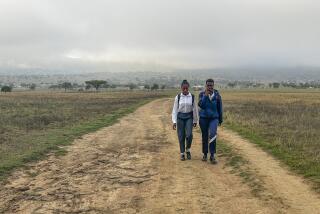Breaking Away From Herder Mentality
- Share via
TEYATEYANENG, Lesotho — Until Molefe Sejane got his first taste of proper school this year, the 13-year-old’s only classroom was the vast open plains far up in the hills from his home. His self-taught “lessons” were repetitive: the care and feeding of five sheep.
But Molefe got lucky. The uncle who had raised him recognized that the boy’s future lay in counting sums, not sheep, and allowed him to give up full-time herding for learning. Education has increased his confidence and his ambition.
Thousands of other boys in this tiny mountain kingdom are less fortunate. Grinding poverty in rural areas has forced families to sacrifice their sons’ education in favor of protecting their livestock--in most cases here, a family’s only source of wealth.
“It’s a serious problem,” said Kimberly Gamble-Payne, the UNICEF representative in Lesotho. “About 20% of the school-age boys are out of school for one reason or another, and the most common cause is herding.”
A cultural norm that has metamorphosed into an economic necessity, the practice of making all boys shepherds has made Lesotho an anomaly in Africa. Here, girls are given the opportunity over boys to attend school, and women are in general more literate than men.
In an effort to protect children’s rights to education, and to redress the academic balance between the genders, the Lesotho government has launched a full-court press to get boys educated. Free elementary school education was introduced in 2000 through third grade, and the government, which last month won a landslide victory in general elections, plans to enforce compulsory primary schooling for all children by next year.
“Everybody needs some form of learning. If you are not literate, you are living in the shadow of other people,” said Thakane Tsilo, a informal education trainer with the Lesotho Distance Teaching Center, a government-funded organization that teaches literacy to people without access to a formal education. About 80% of the group’s students are “herd boys” who don’t attend school.
Boys as young as 6 are sent to the mountains to look after livestock, including sheep, goats, cattle and donkeys. While some boys shepherd during the day and return home in the evening, many live away from home for months at a time in makeshift shelters that form so-called cattle posts. Others are hired out by their family and live lonely and precarious lives, looking after other people’s animals.
Lesotho ranks among the poorest 50 nations in the world, according to U.N. statistics. An economy based on subsistence agriculture means that livestock defines a person’s social status.
Cattle are particularly held in esteem because they are used for payment of marriage dowries. They’re also slaughtered to mark occasions such as births, deaths and weddings.
“It’s important to have a herd boy to take care of these precious [animals],” said Pius Fako Masupha, chief of Ha Mamathe, a settlement within Teyateyaneng where he estimates there are as many as 2,000 herd boys. “You will find a herd boy in each and every family that has cattle.”
Before the 1880s and the discovery of diamonds and gold in South Africa--which surrounds tiny Lesotho--herding was primarily a man’s job. But with the precious minerals came mines and an opportunity for employment, and thousands of Lesotho men flocked to the pits. With women and children left behind, it soon became the responsibility of the boys of the household to tend the livestock.
“Most who end up being herd boys are from poor families,” said Tsilo, the literacy trainer. “And if families are poor, they usually hire out their boys.”
Some of them earn as little as $120 a year for herding--usually never seeing a cent of that money themselves--and often live alone in the mountains, braving the harsh, snowy winter elements and hunting for food when their supplies from home run out. Sometimes they share their dismal accommodation and scant supplies. None has access to schooling, health care or other basic social services.
“Some human rights groups have called [herding] a contemporary form of slavery,” Gamble-Payne said.
And the dangers are vast. Cattle rustling has become a major problem, literacy program officials said. The boys often become targets of physical abuse by the attackers. Dozens have been killed while on duty in the hills.
“We consider herding one of the most hazardous forms of child labor,” Gamble-Payne said. “Unlike the old days, when stock theft was done with bows and arrows and slingshots, now it’s done with guns. There’s a lot of violence.”
The boys tend to herd from around age 6 to 15, when they go off to circumcision school. This traditional male rite of passage, in which the boys are also taught the responsibilities of manhood, lasts for a couple of months.
“After that they feel they have crossed over from being boys to men,” Tsilo said.
Until recently, it would then be off to the mines in South Africa, but a massive retrenchment of mine jobs has meant that few young men are left with any choice but to go back to herding.
The physical and mental isolation they experience at cattle posts often breeds unhealthy behavior and attitudes, sociologists here say. Many are so introverted and traumatized by years of isolation, or of living only among boys, they find it difficult to re-integrate into society as young men when they finish herding.
Their lack of schooling and etiquette often leads to social discord.
“The strain caused by the disparity between the literate and employable woman and the disempowered man is creating a lot of problems at home,” Gamble-Payne said. “Violence against women has increased exponentially.”
Lesotho is a patriarchal society, where a married woman still needs her husband’s signature to get a passport, or a loan.
In an effort to restore some of the herd boys’ rights, the government has established several learning posts throughout the country’s most far-flung regions. Here, community volunteers tutor the boys in basic literacy, counting and other life skills. Other tutors, typically older women, hold classes in their home compounds for those boys lucky enough to return to their families each evening.
Molefe had a year of such tutoring before he started school. Other boys, who have never seen the inside of a proper classroom, just seek to learn the basics.
“They want to read and write for themselves so that they can apply for any jobs if they are advertised,” said Maau Lekopa, 72, a volunteer tutor who holds evening classes in her living room.
Many older men have been inspired by the eagerness of herd boys to learn and have also started attending the sessions.
Tsoteng Khetheng joined Lekopa’s classes last year when he was 52. A herder all his life, he never attended school. Now he wants desperately to learn to read and write.
“I think it will help me in many aspects of my life,” said Khetheng, who recently found work as a driver but has been unable to pass the test for his license. “Education is more important than herding.”
One of the biggest challenges is getting most people to believe that, educators and government officials say. Rural people rely on livestock to survive.
“It’s really the issue of making people appreciate the rights of herd boys and sensitization to the conditions under which they are working,” said Itumeleng Kimane, a sociologist at the National University of Lesotho. “People generally feel children are children. They should be seen and not heard. So it’s been difficult to change people’s perception toward child labor.”
Government plans to mandate primary education for all children is one move to counter such feelings. Authorities are also investigating the possibility of introducing organized commercial farming that could offer some relief to children forced to do agricultural chores, such as herding.
Said Tlohang Sekhamane, Lesotho’s government secretary: “Subsistence farming will become less, in favor of commercial farming. And when that happens, children will have no role in this.”
Sixteen-year-old Molefi Mopeli, who has looked after his family’s cattle since he was 8 but now divides his days between herding and schooling, said he welcomed the opportunity to learn.
“I like animals,” he said. “But I love going to school more.”
More to Read
Sign up for Essential California
The most important California stories and recommendations in your inbox every morning.
You may occasionally receive promotional content from the Los Angeles Times.














